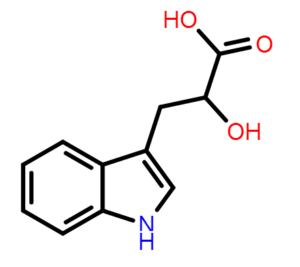Abstract
Background
 Necrotizing enterocolitis (NEC), a necrotic inflammation of the intestine, represents a major health problem in the very premature infant. Although prevention is difficult, the combination of ingestion of maternal-expressed breastmilk in conjunction with a probiotic provides the best protection. In this study, we establish a mechanism for breastmilk/probiotic protection.
Necrotizing enterocolitis (NEC), a necrotic inflammation of the intestine, represents a major health problem in the very premature infant. Although prevention is difficult, the combination of ingestion of maternal-expressed breastmilk in conjunction with a probiotic provides the best protection. In this study, we establish a mechanism for breastmilk/probiotic protection.
Methods
Ultra-high-performance liquid chromatography-tandem mass spectrometry of Bifidobacterium longum subsp. infantis (B. infantis) secretions was used to identify an anti-inflammatory molecule. Indole-3-lactic acid (ILA) was then tested in an established human immature small intestinal cell line, necrotizing colitis enterocytes, and other immature human enteroids for anti-inflammatory effects and to establish developmental function. ILA was also examined in immature and mature enterocytes.
Results
We have identified ILA, a metabolite of breastmilk tryptophan, as the anti-inflammatory molecule. This molecule is developmentally functional in immature but not mature intestinal enterocytes; ILA reduces the interleukin-8 (IL-8) response after IL-1β stimulus. It interacts with the transcription factor aryl hydrocarbon receptor (AHR) and prevents transcription of the inflammatory cytokine IL-8.
Conclusions
This molecule produced by B. infantis (ATCC No. 15697) interaction with ingested breastmilk functions in a complementary manner and could become useful in the treatment of all at-risk premature infants for NEC if safety and clinical studies are performed.




